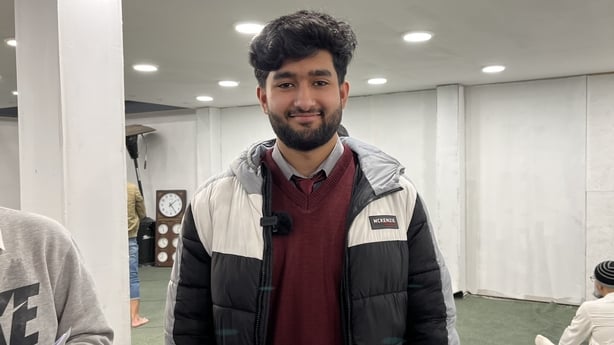More than 80,000 Muslims in Ireland are preparing to begin Ramadan tomorrow.
They will fast from dawn until sunset until the end of March when they will celebrate with a day time feast called Eid al-Fitr.
Ramadan is a celebration of when the Qur'an, the Muslim holy book, was first revealed to the Prophet Muhammad and the exact dates change every year.
Ramadan is the ninth month of the Islamic calendar, which is based on the cycles of the moon.
During this month, around 1.6 billion Muslims worldwide will observe fasting, from dawn to sunset.
Muslims will fast from all foods and liquids, including water. If any days are missed, they can be made up at a later date, or the person who missed the fast can provide a meal for someone in need.
A typical day of fasting starts with a Muslim waking up just before dawn for their first meal of the day, known as Suhoor or Sehri, and then followed by the morning prayer known as Fajr.
Muslims will then go about their normal day, at school or at work, just like how they usually would.
Then, once sun sets and the evening call to prayer is made, Muslims will break their fast. This meal is known as Futoor or Iftar.
A fast is usually broken with a date and a glass of water. This is because dates are easily digested and are a quick source of nutrients and energy. Dates are also believed to be what the Prophet Muhammad broke his fasts with. Traditionally, dates are eaten in odd numbers by Muslims.
Once the fast is broken, Muslims will complete their prayers and then enjoy their evening meal with family.
As a religion Islam has five pillars, or duties, to be fulfilled.
Fasting is one of the five pillars, along with testimony of faith, prayer, giving to charity and a pilgrimage to Mecca, the holiest of Muslim cities and the birthplace of the Prophet Muhammad.
All Muslims are expected to take part every year, but only those who are fit and able to complete the fast.
There are some exceptions for fasting, young children, the elderly, pregnant women and those who are travelling.
'Brings family and friends together'
Imam Rashid Munir, of the Al-Munir Mosque in Waterford, said during Ramadan "Muslims like to do extra prayers, extra charity and extra recitation of the Qur'an" to get more rewards.
He said good deeds are multiplied by 70 times when done during Ramadan.
Mahrukh Rashid said it is a month of doing good deeds and getting rewards.
"It brings family and friends together, no matter how busy we are in our daily lives," she said.

Leaving Cert student Muhammad Hussain says that he has to get up early to eat before dawn.
"We have to manage to get to school, it's a long day," he said.
During the month, Muslims pray five times a day.
Haider Ali Rashid, 14, said that there is prayer room in his school and "during break times, some of the members of the Muslim community, we go to [there] to pray".
While this is Haider's seventh Ramadan, it is the first one for Sheila Kearney, who reverted to being a Muslim a year ago.
"I'm very excited and nervous ... I don’t know what I’m in for but I’m ready," she said.
Additional reporting Reem El-Hassany






